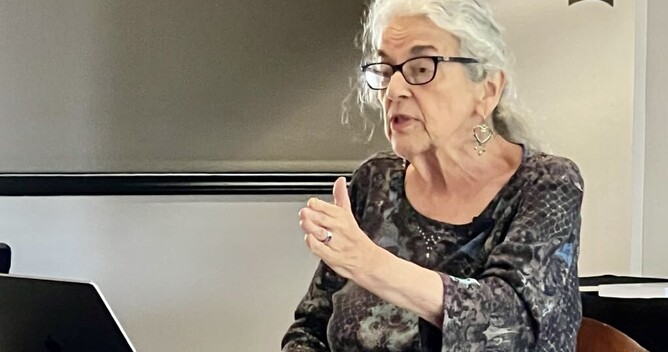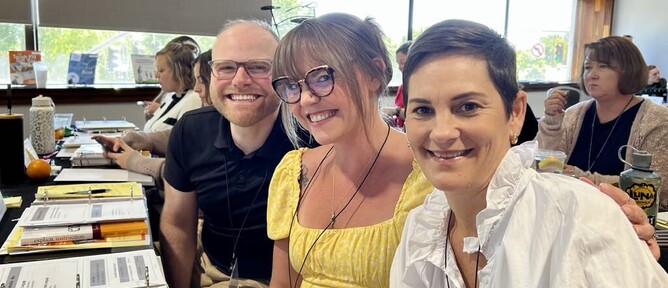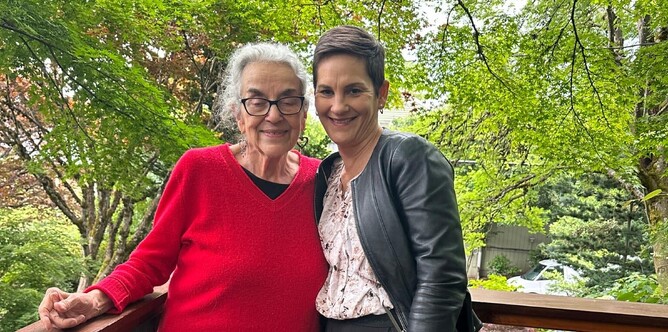Insights from the Explicit Instruction Academy with Dr. Anita Archer
After taking some time to reflect on an incredible week of learning with the amazing Dr. Anita Archer at the Explicit Instruction Academy Training of Trainers, I’ve crafted this summary of my time with her.
Throughout the training, Dr. Archer consistently emphasised three pivotal aspects. First, the 13 elements of explicit instruction, detailed later in this blog, that prepare students for learning expectations with remarkable logic and practicality. Mastering these elements is crucial for effective teaching. Second, she continually stressed the importance of providing multiple opportunities for students to respond—ideally between 6 to 9 per minute. Third, the critical role of explicitly teaching vocabulary.
The experience was nothing short of remarkable. Learning from such an esteemed educator of explicit instruction, was both a privilege and an inspiration. Over the five days, I absorbed invaluable insights and practical strategies. To ensure everyone can access these insights, I couldn’t help but write a blog to share a rundown of the five days.
An Inspiring Start Full of Insights and “Archerisms”
Setting the scene for a week of thinking deeply and learning, Dr. Anita Archer's sessions were filled with profound insights and memorable "Archerisms". A classic on day one that many of you will know well was, "How well I teach = How well they learn", underscoring the direct impact our teaching methods have on student learning. She also emphasised the need for a supportive and engaging classroom environment by stating, “We don't want cold calling in classrooms; we want warm calls", allowing students advance notice and the opportunity to opt out of sharing in front of the class.
Dr. Archer highlighted the importance of keeping students engaged, stating, "We must teach in such a way as to gain attention and maintain ATTENTION". She underscored the significance of repetition and practice, "Learning occurs with rehearsal and retrieval". Dr. Archer also noted, "EQUITY is in the ACTIONS we take", emphasising how our actions in the classroom can promote equity.
Another statement that resonated with me was, “The only problem with silent reading is the huge number of silent reader fakers". It reminded me of how far we’ve come in our knowledge and understanding, and that instead of beating ourselves up, we should continue learning and refining. Many times I reflect on my days as a school teacher and principal and have to remind myself that we don’t know what we don’t know.
She stressed the importance of clear communication, "Clarity requires very clear language, pausing at certain points", and highlighted how fluency in basic skills supports higher-order thinking with: "If you have to think how to form the letters, it takes away from your cognition". Dr. Archer reminded us of the importance of mastering our craft by saying, "Teaching is a lost art; we have to learn how to do it", and noted that maintaining a lively pace can reduce mistakes, "Pick up the pace and the errors go down".
She also emphasised the need for consistent vocabulary instruction with, "Vocabulary instruction in every class, every day".
That concluded day one. Our brains were full to the brim! There were so many fantastic takeaways that I feel privileged to share. If I had more time, I could honestly write a blog on pretty much every point she made!
Crafting Effective Instruction
The second day was focused on designing instruction to enhance student outcomes. One of the key messages was the importance of aiming for low prep-high outcomes, not high prep-high outcomes, emphasising efficiency. Dr. Archer stressed that technology cannot replace the effectiveness of teacher-led instruction, as human interaction is irreplaceable.
She also stressed the importance of structuring lessons with three parts: Opening, Body, and Closing, noting that a clear structure enhances learning. She emphasised that lesson closings should be relevant and interactive to increase retention and highlighted that the end of a lesson is just as important as the beginning. Dr. Archer reminded us to consider the necessary knowledge, vocabulary, skills, and strategies when designing a lesson, underlining the importance of comprehensive planning. She also encouraged us to teach students to monitor their work quality by asking, "Does it make sense?" promoting self-assessment and independence.
Dr. Archer highlighted the need to maintain attention throughout the lesson, not just at the beginning, to prevent behavioural issues. She stressed the importance of focusing on transferable knowledge and avoiding unnecessary details, teaching for understanding. Consistent engagement was also noted as key to preventing inappropriate behaviour, with active participation being crucial to classroom management.
NB: Active participation will be the focus of Dr. Archer’s keynote at the upcoming 2024 Cultivating the Literacy Landscape symposia.
Vocabulary and Knowledge
Day three delved into designing instruction with a specific focus on vocabulary and knowledge acquisition. Dr. Archer recommended pre-reading texts when reading aloud and selecting texts slightly above students' age (approx. 2 years) and reading ability to help build a knowledge network. She emphasised the inclusion of informational texts and the use of fast-mapping as a quick strategy for building vocabulary comprehension during read-alouds.
Dr. Archer pointed out that wide independent reading won’t make students proficient readers until they can read words, stressing the importance of foundational skills. She also recommended limiting vocabulary sessions to teaching a maximum of four words, as focused instruction is more effective. In addition she advised staying on the same topic for two weeks to build a knowledge network, highlighting the importance of depth of understanding.
When looking to the classroom set-up, she stressed that every classroom should have a dedicated teaching arena, as classroom arrangement impacts both management and instruction. Teachers should give instructions from this designated arena, so students recognise it as dedicated teaching time, ensuring clarity and focus.
Mastering Delivery
Day four concentrated on the delivery of instruction, emphasising the importance of frequent opportunities to respond. Dr. Archer highlighted the need to begin each day with a review to move information from working memory to long-term memory, reinforcing learning.
Dr. Archer stressed the importance of ensuring active participation throughout lessons to promote equity, as involvement supports learning for all students. She also recommended asking text-specific questions during reading comprehension sessions to keep students focused on the text, as targeted questioning enhances understanding.
Feedback, Practice, and Fond Farewells
The week with Dr. Anita Archer was surreal. To sum up the final day, here are the 13 elements of Explicit Instruction along with some of my favourite quotes from Dr. Archer.
13 Elements of Explicit Instruction:
Critical content
Obtainable chunks
Organised and focused
Goals
Review
Frequent responses
I DO
WE DO
YOU DO
Feedback
Monitoring
Perky pace
Judicious practice
Memorable Quotes:
"Teach the best, leave the rest."
"Writing things down significantly enhances your memory."
"Utilise a Me or We option during reading instruction."
"Teachers, monitoring looks like – Look around, walk around, talk around."
"The goal of feedback is to close the gap between current performance and desired performance."
"More practice: deliberate practice, retrieval practice, spaced practice."
"Teach with passion, manage with compassion."
The week was a journey of learning, connection, and growth. I'm immensely grateful for the hospitality of the Safe and Civil team and the wonderful American participants. I look forward to reconnecting with many of them when I return to the US later this year.
Final Thoughts
Knowledge alone is not enough; we must also know how to teach.
It is essential to incorporate all elements of explicit instruction in our practice, not just a select few. The proof is in the pudding: delivery is where the rubber hits the road.
A great starting point for schools implementing the science of learning is to focus on explicit instruction, particularly by gathering data on opportunities to respond during teaching sessions. Opportunities to respond are one of the most significant levers that can enhance engagement, learning, and retention. It's a no-brainer. When we know better, we must practice better.
Thank you, Dr. Anita Archer, for an unforgettable week of learning and inspiration.
Exciting News: Dr. Anita Archer is Coming to New Zealand!
Don't miss out on the chance to learn from Dr. Anita Archer herself at the upcoming Cultivating the Literacy Landscape Symposium. This is a fantastic opportunity to gain insights and strategies from one of the best in the field. We cannot wait to host her, and I hope to see you there!







